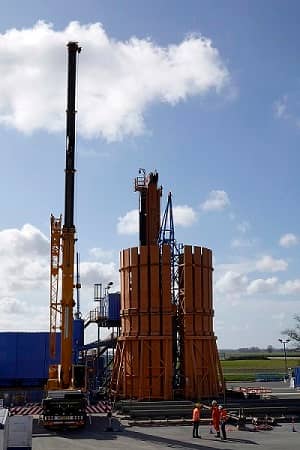The government inadequately protects drinking water aquifers against the risks of drilling for geothermal energy. In the Netherlands Court of Audit’s opinion, this is a matter of concern. The Court concludes from an audit that there is no coordination of activities underground, where drinking water extraction and geothermal energy production can come into conflict with each other.

The Court’s audit highlights the tension between two issues of great importance: the supply of drinking water and energy transition. Some 60% of the Netherlands’ drinking water is fresh groundwater that is pumped up from a depth of between 20 and 300 metres. Reserve sources of drinking water lie even deeper, between 200 and 700 metres. Geothermal energy is accessed at an even deeper level from rock formations at a depth of 2-3 km, out of which a lot of hot – 60-90˚C –salt water is pumped. Despite the differences in depth, the two activities can come into conflict with each other. Drilling through the rock layers to access geothermal energy puts the quality of drinking water at risk.
Leaks
Geothermal pipes are susceptible to corrosion (rust). Water that is pumped up from deep underground is not only hot and salty but also contains chemicals (some occur naturally, others are added to prevent corrosion). If corrosion weakens or burns a hole in the pipes, salt water can leak into the fresh water aquifers that provide our drinking water. In addition, engineers have to drill through underground rock formations to construct geothermal systems. If the pipes are not properly sealed, groundwater pollution can seep into drinking water aquifers.
This is a real risk, but it is not known whether such incidents have taken place. The monitoring networks of the bodies that supervise groundwater, including provinces, municipalities, drinking water companies and water authorities, are not dense enough to register groundwater pollution close to a geothermal well. The owners of geothermal systems are often required to drill monitoring wells, but they are no deeper than 5 metres and are designed to detect leaks from that part of the system that is above ground.
The supervisor, the State Supervision of Mines, has detected many instances of corrosion in geothermal pipes. In 2020, three wells were taken out of operation for a lengthy period time in connection with potential leaks. The supervisor considers the risk of salt water contaminating fresh water to be ‘considerable’.
Eliminating risks
The Court of Audit thinks the risks to underground drinking water aquifers should be carefully considered before geothermal permits are awarded. It also thinks the Minister of Economic Affairs and Climate Policy (EZK, responsible for geothermal energy) and the Minister of Infrastructure and Water Management (I&W, responsible for drinking water) should take the initiative to lay down in law how geothermal and drinking water interests should be balanced, particularly in view of the ambition of rapidly scaling up geothermal production. This would clarify how the two interests are implemented and assessed.
In response to the report, the ministers and state secretaries at EZK and I&W said they recognised the need to adapt geothermal policy and were working to do so. However, they did not recognise the tension between the interests of geothermal production and those of drinking water supply. In its afterword, the Court of Audit said the ministers did not fully understand the urgency of the problem and the importance of more centralised coordination. They are accordingly ignoring a problem that is happening in the field.
Geothermal energy and drinking water are accessed at different depths
The advance of geothermal energy
The Netherlands has been producing geothermal energy since 2007. By 2020, some 22 wells had been drilled, mainly in horticultural areas. The government’s ambition is to rapidly scale up the use of geothermal energy. In the search for suitable locations, urban areas are becoming more attractive. The first well in a large city, The Hague, was drilled this year.